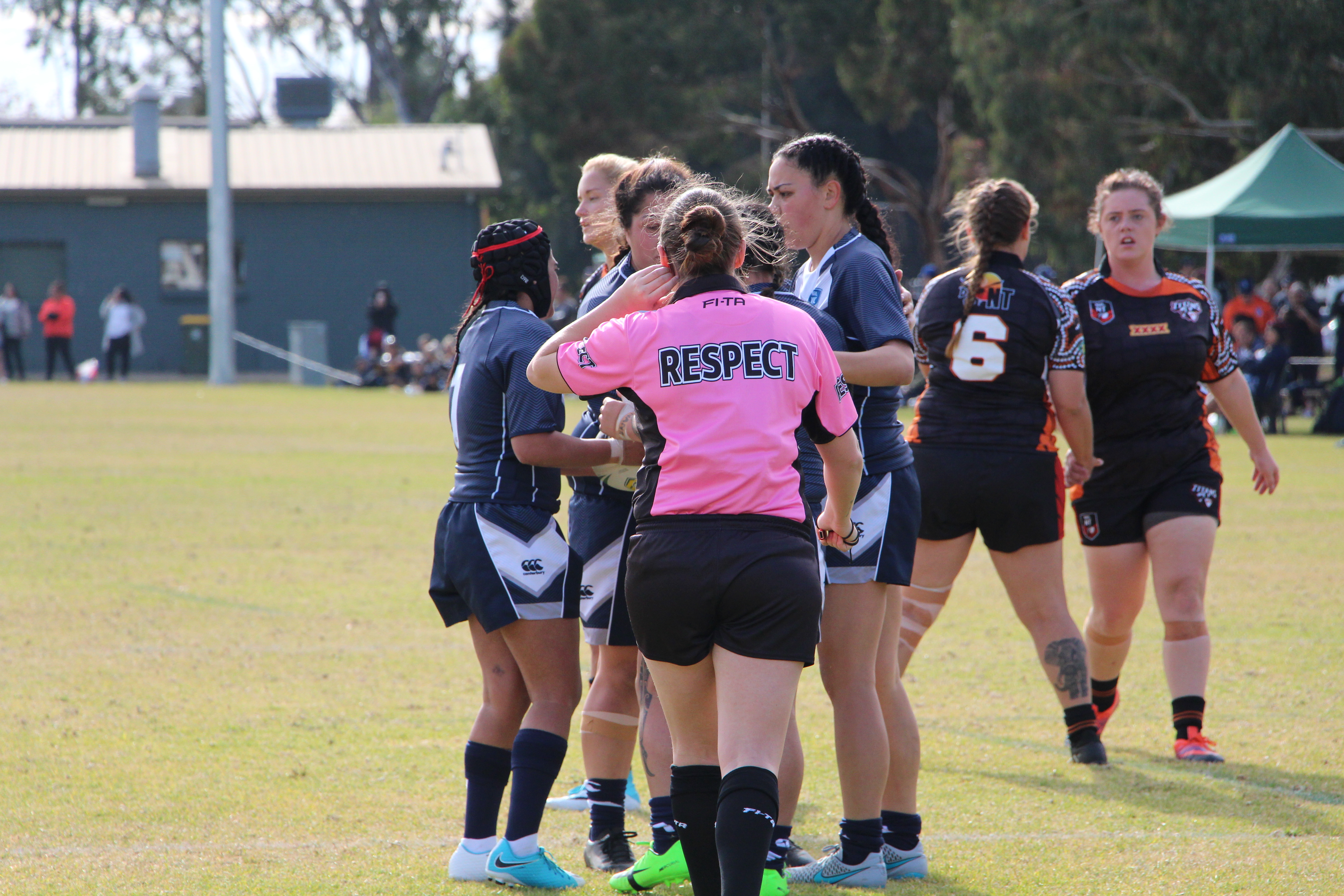Squeezing out bad behaviour from the sidelines
A question I’ve been asking myself recently is: who is ultimately responsible for removing a person who relentlessly abuses from the sidelines week-in, week-out?
- Is it the mainly-volunteer led committee members who (more often than not) aren’t skilled in the art of conflict resolution?
- Is it the club leagues and their tribunals who only get called up for the most serious offences?
- Is it the local council who manages the land on which abuse is occurring?
- Or is it the Police who should be intervening proactively to keep people safe and not just when there’s an offence?
There’s no ‘silver-bullet’ answer to the question. But the closest we get is a combination of all of these parties working together, with the power of the collective, to marginalise bad behaviour and squeeze it out of public spaces.
Clubs, of course, are on the frontline, and have the most to gain by cracking the code of poor sideline behaviour at our clubs.
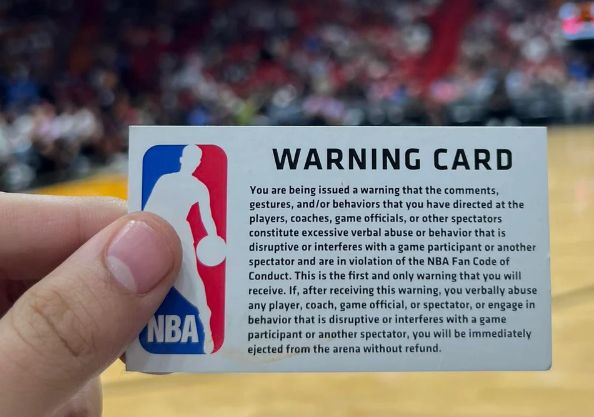
Warning card at National Basketball Association (NBA) matches, handed to disruptive and abusive fans
Groundhog Day
The reality is that sporting codes, their leagues and clubs operate in an uncomfortable grey zone – wanting desperately to keep sport safe and vibrant, while knowing the culture of sports clubs has for too long allowed, and even encouraged disrespect under the guise of “passion”.
Like me, you probably perk up like a meerkat every time you read a news headline about parents or spectators abusing umpires/referees. Same old story, right?
- Sporting codes take action to stop parents verbally abusing young players and umpires – By Bree Dwyer, ABC Sunshine Coast
- Watch the shouting! How parents’ sideline behaviour can strip the fun out of children’s sport – By Elise Waghorn, The Guardian / The Conversation
- You’ve been ‘volun-told’ to coach junior sport – here’s how to best handle the parents involved – Cassy Dittman, Michael John O’Keeffe & Steven Rynne, The Conversation
- Veteran Geelong footy umpire says there was ‘appalling’ abuse of officials during the Thomson v North Geelong game – Herald Sun
As winter clubs warm into their new season, they’re also desperately hoping it’s not their turn to have an ugly parent incident. They know it will cause harm in their club, become gossip-fodder and will stretch their committee’s patience as they go through the confronting experience of mediation to resolution.
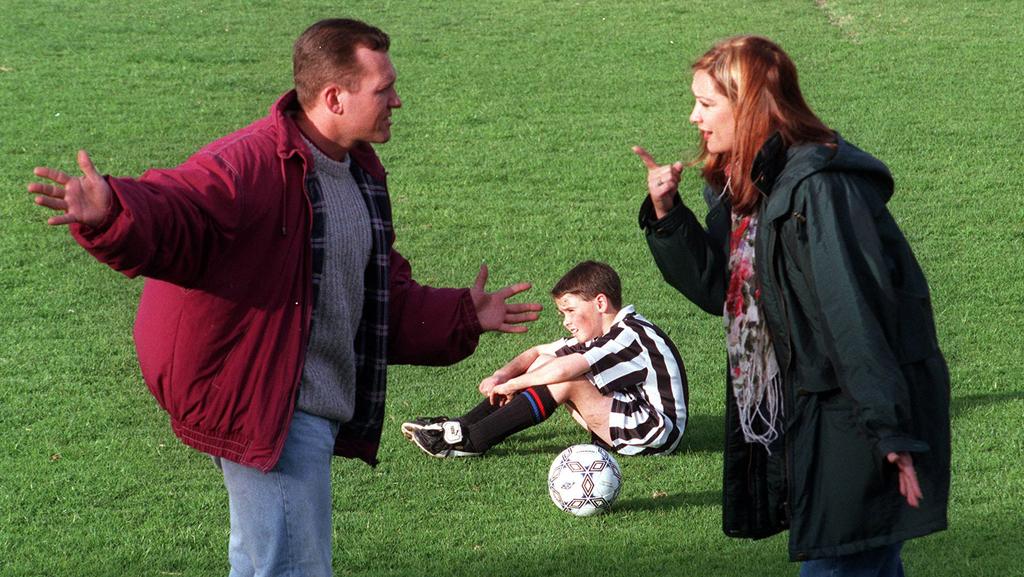
Man and woman portraying angry parents for story on abusive school sport parents. news.com.au
All teams united (in abusing match officials…)!
Some clubs will do the hard yards in building the capacity of the club to notice the issues and when it’s getting out of hand. And for good reason: working against the ingrained culture that enables the abuse of match officials is an important frontier.
Match officials, while having the power to adjudicate on the game, often have the least support and power on the actual playing arena. This can make the experience of officiating lonely and within a hostile environment.
Clubs should not be picking and choosing here. On the one hand, they can (and do) come together to highlight important causes such as the prevention of violence against women. But on the other hand, they seem to turn a blind eye, joining forces in their mutual pile-on of match officials.
Disrespect and ‘power-over’…
When it comes to the abuse from the sidelines, the power of the abuser is hugely significant. This person may be an ‘untouchable’ within the club or have the capacity to make it extremely unsafe to challenge their bad behaviour.
Clubs often feel helpless to take meaningful action, knowing that their well-thought-through plans, their considered code of conduct and approach to values can be upended by a careless parent capable of using their power to continue in their ways.
If the club takes action, they fear reprisal from a powerful person. If they don’t act, they open the club up to allegations of double-standards or “helping their mates”.
Without clear boundaries and communication on these issues, the abusive parents are likely to go unchallenged and double-down into their rhetoric that the umpire is a “white-maggot”, that they need to “check their eyesight”, surely they’re “taking bribes”, they’re too easily swayed by the opposition teams nagging or just simply “crap” at their job.
Sadly, this abuse and demeanour doesn’t differentiate between a fully professional umpire or a volunteer filling in for your kids Sunday game.
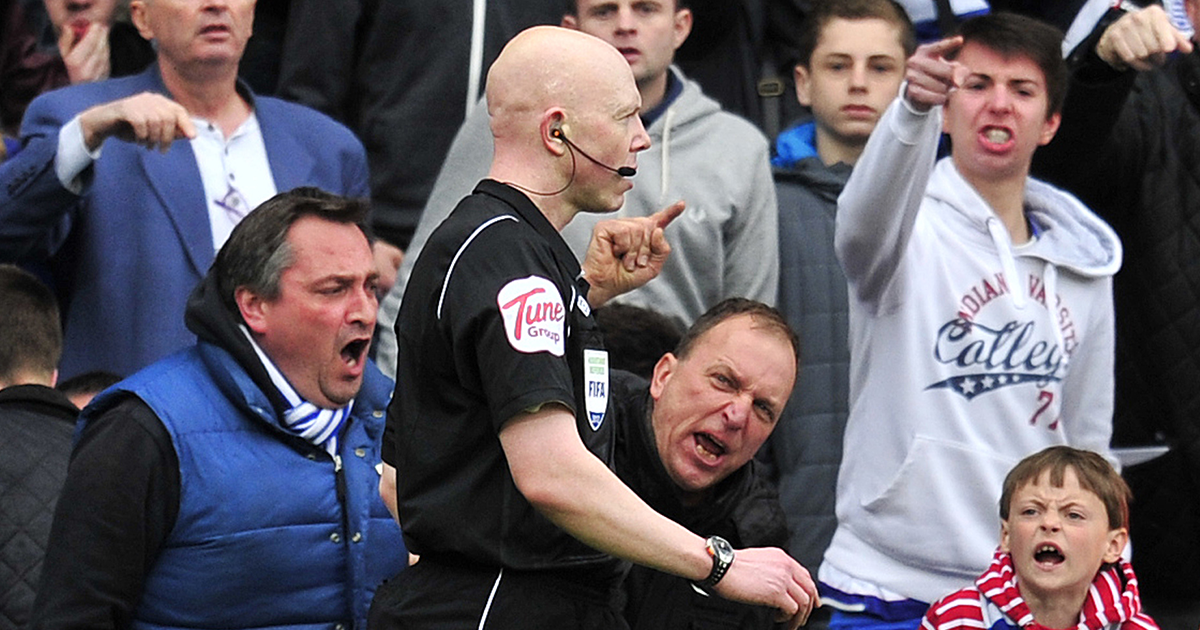
Football referee being abused by players at an English Premier League match.
Respect and ‘power-with’…
However, the power of bystander parents is even greater. It’s just that it needs to be mobilised!
Many parents are deeply upset by the bad behaviour on the sidelines. They fear reprisal and keep quiet. They’re very keen to avoid a confrontation. Their clubs do the same, dealing with situations reactively and dealing with the fallout at great cost to the club committee members.
The power of these parents and supporters can only be unlocked when the club takes a lead, providing the guidance, amplifying and supporting a movement of respect within the club. Each parent joining the movement spurs the club’s good intentions into a powerful force.
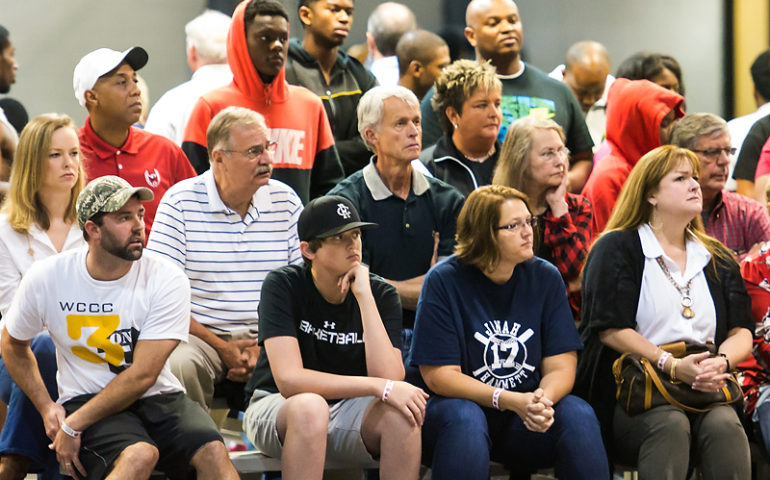
Parents and spectators at a community Basketball match
All together now.
So, who’s responsible for making sport safe when all this gets a bit too much and abuse becomes rampant?
Who, at the conclusion of weekend matches, can put their hand up and say they’ve helped to keep sport safe?
It has to be all of us.
Parents need to help their clubs. Give them support, commend clubs when they show the way by taking a lead and make zero tolerance the aim.
Clubs must persevere to continue seeking ways to support self-examination, to identify the acceptable behaviours in their club, to acknowledge the influence of mental health on sideline abuse and to find the safe paths to sanctioning when necessary.
While clubs might be ultimately responsible, they are accountable to their members to maintain a safe environment. In doing so, they need to create connections with their relevant sports leagues, associations, councils and law enforcement.

Coach and players united
Build and maintain
Club Respect’s resources support clubs on this path. For clubs keen to challenge their club culture they can start with our AWESOME framework and Club Roles, by identifying ways to strengthen the foundation of the club, to determine appropriate behaviour and minimise the likelihood of bad behaviour.
Issues will appear around the club, and they can handle heated issues safely following our SMART Steps. Safety first, always.
In the meantime, we’ll continue our efforts to support match officials and develop a culture of respect in clubs and provide support to match officials across multiple sports to address what are fundamentally similar concerns across sports codes.

Keep on keeping-on with Club Respect resources supporting match officials
- Read Club Respect’s series, Sport at the Crossroads, written by Patrick Skene and exploring the way different sports codes and associations are tackling the abuse of officials.
- Listen to Club Respect’s podcast, Smart Plays. Specific episodes on match official abuse: Episode 2: Female footy umpiring crisis & Episode 9: The scourge of match official abuse
- Attend the National Officiating Summit in Melbourne, November 2024

Tarik is the Manager of Club Respect. He sees the potential of sport in creating a more inclusive and cohesive society and is committed to addressing issues in community sports to promote values of fair play, inclusion, and respect. Tarik loves playing footy with his 2 kids and a mad supporter of the Carlton Blues.
